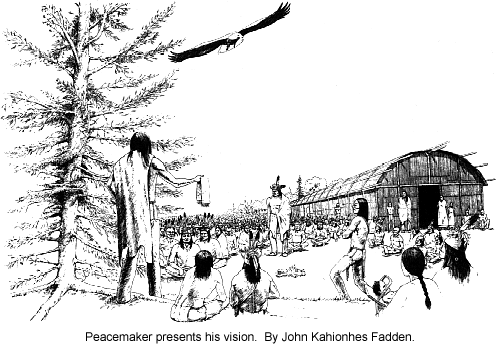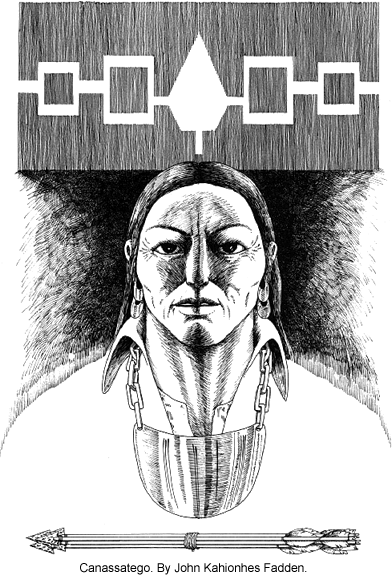 |
Canku Ota
|
 |
|
(Many Paths)
|
||
|
An Online Newsletter
Celebrating Native America
|
||
|
April 1, 2010 - Volume
8 Number 4
|
||
|
|
||
|
Benjamin Franklin:
Respect In Political Discourse Is Good Native Value
|
||
|
by José Barreiro
for Indian Country Today
|
||
|
Calm, deliberate discussion that respects a speaker and disallows interruption is a longstanding American value. Benjamin Franklin noted it early among American Indians and wondered if it constituted a better system than the mocking, catcall style of the British House of Commons. This 1783 observation by the "sage of Philadelphia" is worth recalling at a moment when some pundits are suggesting going to the British parliamentary approach for the next phase of American political discourse – arguably to apply an interruptive, point-counter-point talk show format to the congressional and national dialogue.
The call is understandable, given the lack of fruitful dialogue across the political aisles today. But it is worth remembering that Franklin cautioned away from the British practice and the "confusion" arising from the disrespect of a speaker, "cut off in the middle of [his remarks] by impatient loquacity." In contrast to this seeming lack of manners, Franklin pointed to the "great order and decency" of Native American oration. The Native manner of political address would not be the only political example of interest Franklin cited about American Indians. Some years ago, academics hotly debated just how far Native people had "influenced" the political thinking of the American founding fathers. As usual, some proponents went too far, asserting an easily dismissed line-by-line comparison between the Great Law of the Confederacy of the Haudenosaunee (Iroquois or Six Nations) and the U.S. Constitution. Opponents, of course, eviscerated this favored straw man, then burned, stomped and otherwise presumed all positions proposing an influential intellectual vitality in Native cultures as naïve or politically motivated. Ah, for the confusions of action – reaction.
In 1750, while deliberating thoughts on the "necessary unity of the colonies," Franklin mocked his fellow colonial leaders, presumably the elite of the promised republic, with the much-published argument: "It would be a very strange thing, if six nations of ignorant savages should be capable of forming a scheme for such an union, and be able to execute it in such a manner, as that it has subsisted ages, and appears indissoluble; and yet that a like union should be impracticable for ten or a dozen English Colonies. … who cannot be supposed to want an equal understanding of their interests." (Letter to James Parker, Philadelphia, March 20, 1750). Franklin's exhortation to gather American political forces is equally relevant today, when the unity of the American Republic appears in peril and in need of re-energized dialogue. The manner of its historically successful undertaking – by the value of careful, diplomatic and deliberate discussion – he attributes to American Indians, of whom he writes that, "having frequent occasions to hold public councils, they have acquired great order and decency in conducting them." Wrote Franklin: "He that would speak, rises. The rest observe a profound silence. When he has finished and sits down, they leave him five or six minutes to recollect, that if he has omitted anything he intended to say or has anything to add, he may rise again and deliver it. To interrupt another, even in common conversation is reckoned highly indecent." This important observation of an American Indian value, which sustains in most contemporary tribal councils and arguably proposed for American political discourse, is vintage Franklin. The Indians, he writes, "generally study oratory, the best speaker having the most influence. …" The founding father lets us know he compares it favorably to the overseas approach: "How different it is from the conduct of a polite British House of Commons, where scarce a day passes without some confusion that makes the Speaker hoarse in calling to order; and how different from the mode of conversation in many polite companies of Europe, where if you do not deliver your sentence with great rapidity, you are cut off in the middle of it by the impatient loquacity of those you converse with and never allowed to finish it." Observed clearly by the founding genius of the American Republic, collected, reflective thought is to be respected. This is still a good first rule for effective mutual understanding. We might do well listening to Benjamin Franklin. The inherent unity and potential power of good communication is an American value worth keeping in these loud, egocentric times. José Barreiro is assistant director for research at the Smithsonian National Museum of the American Indian. |
|
|
||
|
|
||
| Canku Ota is a free Newsletter celebrating Native America, its traditions and accomplishments . We do not provide subscriber or visitor names to anyone. Some articles presented in Canku Ota may contain copyright material. We have received appropriate permissions for republishing any articles. Material appearing here is distributed without profit or monetary gain to those who have expressed an interest. This is in accordance with Title 17 U.S.C. Section 107. | ||
|
Canku Ota is a copyright ©
2000, 2001, 2002, 2003, 2004, 2005, 2006, 2007, 2008, 2009, 2010
of Vicki Barry and Paul Barry.
|
||
 |
 |
|
|
The "Canku
Ota - A Newsletter Celebrating Native America" web site and
its design is the
|
||
|
Copyright ©
1999, 2000, 2001, 2002, 2003, 2004, 2005,
2006, 2007, 2008, 2009, 2010
of Paul C. Barry.
|
||
|
All Rights Reserved.
|
||

 On
that issue – as nearly always – Franklin was clear and
focused on a united republic. For the Haudenosaunee Confederacy
chiefs, the dialogue was consistently about the exhortation to unity.
As the major publisher of colonial Indian treaties, Franklin actually
memorialized the key 1744 message from the Onondaga-Iroquois sachem,
Canassatego, to the colonial delegates: "Our wise forefathers established
union and amity between the five (later six) nations. This has made
us formidable. This has given us great weight and authority with
our neighboring nations. We are a powerful Confederacy, and by your
observing the same methods our wise forefathers have taken you will
acquire much strength and power; therefore, whatever befalls you,
do not fall out with one another."
On
that issue – as nearly always – Franklin was clear and
focused on a united republic. For the Haudenosaunee Confederacy
chiefs, the dialogue was consistently about the exhortation to unity.
As the major publisher of colonial Indian treaties, Franklin actually
memorialized the key 1744 message from the Onondaga-Iroquois sachem,
Canassatego, to the colonial delegates: "Our wise forefathers established
union and amity between the five (later six) nations. This has made
us formidable. This has given us great weight and authority with
our neighboring nations. We are a powerful Confederacy, and by your
observing the same methods our wise forefathers have taken you will
acquire much strength and power; therefore, whatever befalls you,
do not fall out with one another."